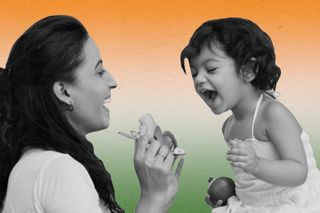
Geography, Culture Can Change Our Parenting
Just ask these Indians living abroad.

“When the minders at my son’s nursery told me that my 3-year-old needed to [feed] himself, as apparently his peers did, I was taken aback. How did they expect such a young child to be able to do this?”
That’s Kiran Sahni, mum to a now 14-year-old boy and 12-year-old girl. As a young mother in London, UK, she often found herself at her wits’ end. Young mothers everywhere often find themselves stumped, but for Kiran it was necessary to figure out how to raise her child in a country so different from India, where she grew up.
Parenting styles and beliefs vary across the world. As this TED article demonstrates, some practices common in one place are unfathomable in another. Adapting to foreign child-rearing mores presents yet another challenge for parents who have grown up in India and shifted abroad. It requires accepting and mastering different dos and don’ts, and even altering the vision of the kind of people they are molding.
“I was astonished to see my son’s friends open their lunch boxes, eat by [feed] themselves, even wipe their hands with a napkin after they had finished, and then put everything away,” Sahni remembers. “That’s when I realised that it was up to me teach him this and many other things other 3-year olds had already accomplished, such as dressing themselves and toilet training.”
But developing such independence in her son was no cakewalk. She had to draw up tremendous reserves of patience, and an additional 20 minutes, to allow her little son several failed tries before he could actually button his own jacket every time they left the house.
“I had no choice,” she says. “I was barely getting by from one day to the next, but this was the only way to ensure my son could keep up with his peers.”
“My daughter isn’t even two yet and she’s [feeding] herself from Monday to Friday, while she’s at day care. … But I can’t help myself. On [the weekends], I end up feeding my little girl with my hands.”
Even if parents plan to accommodate the additional time and patience needed to let fumbling fingers learn the skills, many still battle the instinct to do everything for their kids – an ingrained cultural expression of parental love in India.
“My daughter isn’t even two yet and she’s [feeding] herself from Monday to Friday, while she’s at day care,” says Avantika Chaturvedi, a finance professional and London-based mum. “We do our best to maintain the same schedule and habits on weekends that she has at her day care centre, but I can’t help myself. On those two days, I end up feeding my little girl with my hands.”
Chaturvedi’s parenting battles aren’t just with herself. When her family in India visited her in the UK, they found it hard to understand why she was putting her daughter to bed as early as 7pm every day. Chaturvedi had been through an arduous journey of sleeplessness for the first three months of her daughter’s life, when a visiting health worker advised her to maintain a regular and early bed time for her child. “Now, after my daughter goes to bed, I have time to do personal chores, and my daughter is much happier with a regular routine that ensures she’s well-rested,” she says.
Unlike in India, where most homes have household help or family members to lend a hand, hired help is uncommon in Western countries; if available at all, it is usually expensive. This translates to very busy days for parents, and an early bedtime for the kids. For Sahni, this adjustment came with a bonus: quality, kid-free time with her husband. “The other thing about not having help at hand is that you are compelled to teach your children to be independent and self-sufficient, instead of waiting on them all day,” she says.
Reducing children’s dependency, and protecting their own wellbeing is something Indian parents, whether in India or abroad, seem to struggle with. But Runa Mukherjee, mother to a 3-year-old boy, finds the social structure abroad better supports self-care efforts than Indian society. “Being a new mother here in India, it was all too easy for me get overwhelmed and drive myself to a breakdown toiling after my child day and night, with no thought to my own health,” says Mukherjee, who lives in Ahmedabad.
“On the other hand, I have friends living in various other countries, whose struggles are different,” she observes. “They get plenty of advice from doctors and healthcare workers in their home countries that doesn’t just prepare them medically for becoming parents, but helps them gear up psychologically, too. They are more attuned to methods such letting their babies cry it out, which ultimately gives them all a good night of sleep, but they miss the security that being surrounded by family provides.”
“My kids’ tendency to question everything is something that my family in India finds hard to accept – I still struggle with it myself even after all these years.”
The early institutionalization of childcare in some countries also means parents quickly absorb the native ethos of raising children. Deepti Belwal, a mother of two in London, found day care prompted an unexpected emphasis on consideration. “It’s a wonderful thing, but it’s something that I didn’t realise had to be actively developed,” she says. “I’ve seen them [teachers and carers] repeat the message in several ways: through charts on the walls, verbal reminders, examples in situations, and I reinforce the messages at home. Now, when my children restrict their time on the swing without any prompting just because there’s a queue of kids waiting to use it, I’m filled with pride.”
But the qualities that are valued in one culture may not be as appreciated in another. Sahni says she often wonders if her children will be able to cope up with the street-smart children in India. “And, on the other hand, my kids’ tendency to question everything is something that my family in India finds hard to accept – I still struggle with it myself even after all these years.” Sahni is referring to the importance given to the power of reasoning in the British education system.
“Children here are taught to understand the logic behind everything – they aren’t trained into absolute obedience. My teenage son cannot fathom why I feel the need to pour a glass on milk over a shivling every week; he argues that I should donate the milk to a homeless person instead if I really want to do some good,” she laughs. “I can’t fault his logic, but we’ve agreed to disagree.”
Some convictions remain difficult to shake. For Nupur Jain, a teacher trainee in London, and mother to a 7-year-old boy, the lack of a result-oriented approach to academics is difficult to accept. “My son’s teachers tell me my son is performing satisfactorily in school, but the system here doesn’t test the child’s understanding or extent of knowledge,” says Jain, who grew up in India. To deal with this perceived gap, Jain gives her son worksheets at home that help identify his weaknesses, then guides him in improvement.
Even as parents in a foreign country feel torn between the homegrown beliefs about raising kids, and the unfamiliar tenets that suddenly surround them, at the end of the day, they find a balance that fulfills the universal goal of all parents – doing what’s best for their kids.
Aarti Narang enjoys writing articles of human interest, baking, and eating too much cake. She lives in London, but lost her heart to Bombay long ago.
Related


Aishwarya Kisses Daughter Aaradhya On The Lips
